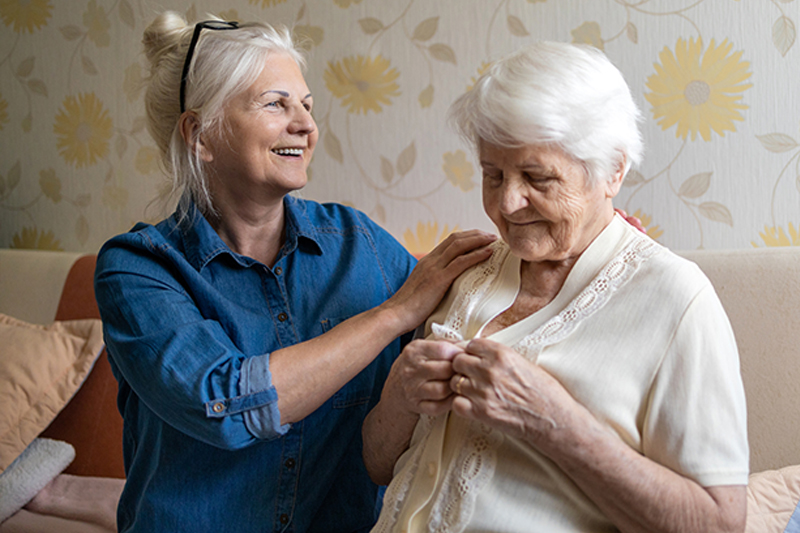
Learn what to expect in the middle stage of dementia.
Getting the news that a senior family member has been diagnosed with dementia is life-changing. Thinking through the many different facets and factors associated with the disease as well as its effects, both at present and in the future, can be overwhelming.
In this three-part series, we will examine the early, middle and later stages of dementia. We’ll outline the type of care required during each stage, what family caregivers can expect, and how Grace Home Care can help.
Middle Stage Dementia Caregiving
The changes in the middle stage of dementia happen gradually, and may even be unnoticeable at first. Eventually, a senior in this stage will start to encounter ever-increasing difficulty with everyday tasks, like getting dressed. It’s vital for family caregivers to continue to promote a sense of autonomy, allowing the senior loved one to complete these tasks at his / her own pace as long as possible (and as long as it is safe to do so). This requires flexibility, patience, and adaptability.
It will likewise become essential to invest additional time in providing care, and to establish innovative strategies and ways to lessen frustration – for the senior as well as for yourself. Self-care becomes extremely important in the middle stage of dementia in order to help caregivers manage stress.
Here is what you may expect to experience during this stage:
Behavioral Changes
- Anxiety
- Impatience
- Depression
- Repetitive behaviors
- Aggressive outbursts (physical and/or verbal)
How You Can Help
Keeping a calm attitude is crucial. Do not disagree or try to reason with someone in the middle stage of dementia. In a soothing and calm tone, recognize the feeling behind the behavior and offer recommendations in order to help. As an example: “Mom, I can see you’re feeling upset about misplacing your favorite shirt. It’s most likely in the washing machine. This pink one looks fabulous on you; do you want to wear it today?”
Recognize that the words and actions being conveyed are not a reflection of you personally, but simply part of the normal development of dementia. Many times, there is an underlying emotion, such as fear, exhaustion, or hunger, driving the behavior. Try to identify the root cause and address that.
Communication Changes
- Losing train of thought
- Forgetting a word
- Repeating statements or questions
- Using more non-verbal communication
- How You Can Help
Accept whatever form of communication is most effective for the older adult, without trying to correct him or her. Modify your communication technique to make it easier for the individual to understand and respond to you. For instance, instead of asking open-ended questions (“What would you like for dinner today?”) offer a choice between just two choices (“Would you like chicken or tuna for dinner today?”). Speak in a clear, soothing tone, and permit the senior sufficient time to reply without jumping in and providing the answer yourself.
Safety-Related Changes
- Wandering
- Driving concerns
- Sundowning
In this stage of the disease, paying closer attention to safety issues becomes crucial. Driving should stop – something that’s typically problematic for seniors to accept. If possible, include the older adult in making this decision. If not, a note from the doctor prohibiting driving is often the best way to gain his / her consent. In the event the older adult is insistent about continuing to drive, you may have to remove the keys, or replace his / her set of keys with nonworking ones.
Similarly, sundowning and wandering become concerning and challenging for family caregivers to manage independently. Partnering with a trusted care provider with experience in dementia care, like Grace Home Care, is an ideal solution. Our caregivers can take the night shift, ensuring older adults are safe and distracted with interesting activities when not able to sleep – allowing family caregivers to get the rest they require.
To learn more about our specialized dementia care in Topeka and the surrounding areas, contact us any time at 785-286-2273.
